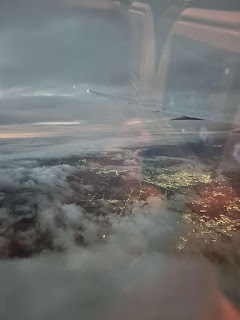Day 9
 |
| Donkey that The Tin Shed had behind their shop in the petting zoo. |

The
Tin Shed where we were able to purchase high quality wool products.
In this shop you can find household items such as sheep pelts and
wool blankets. The wool to make these products come from merino sheep, alpacas,
and possums. When you are not shopping inside the Tin Shed, they have several
farm animals that they have housed in a petting zoo type setting. Many students
spent time visiting with their donkey, alpacas, sheep, and pot belly pigs.
Geraldine Cheese Company where we got our ice cream.

Geraldine Cheese Company ice cream
Once
everyone finished their retail therapy, we headed to Geraldine Cheese Company
30 minutes down the road to get ice cream, muffins, coffee, and some
souvenir’s. Geraldine Cheese Company had the choice of cheese tasting or ice
cream cones for those who are visiting. You can find a selection of unique
cheeses and even see the process they undergo to make the cheeses. On the
shelves of this small business, you will also see a variety of flavors of olive
oil and other fun trinkets.

The
Good Shepard church one of the most photographed pictures on the South Island.
Once we were
on our way, in about an hour we wound up at the Church of the Good Shepherd
which was built right next to frigid Lake Tekapo, which is a glacial lake with
the perfect view of Mount Cook, New Zealand’s largest mountain.
We were lucky enough to see Mount Cook “Aoraki”

Students
in front of Mount Cook. 
Pool
of Salmon fish
We then
headed towards our last stop of the day, High Country Salmon. High Country
Salmon is a salmon farm floating on the glacial waters of Wairepo Arm. They
produce around 20,000 tons of New Zealand salmon that gets sold locally and as
one of the most high-end salmon across the world. We learned that it’s a unique
specie of salmon to New Zealand which gives them several benefits. One of the
best benefits we learned about is the lack of disease that they have as an
island with a unique breed. This helps make their system more efficient as they
can focus more on their feed efficiency and adding in new lines of genetics.
They feed their fish a high pressure pressed pellet, produced in Australia,
comprised of fish meal, fish oil, and durum wheat. They have hope in the next 5
years to move away from the fish oils to other more easily accessible products.
They grow their salmon in round floating nets in the canal. This specie of
salmon is especially suited for the cold glacial waters of the region and with
the warming climate cycle we are in they are concerned whether it will affect
the production of their spawn. We gathered around one of their nets where we
got to listen to the farm manager talk while feeding the salmon. They have a
restaurant on site where they offer freshly harvested salmon that our group
grabbed for the bus ride to our hotel.
The Collie dog monument representing the impact herding dogs
have in the Mackenize Country



Comments
Post a Comment